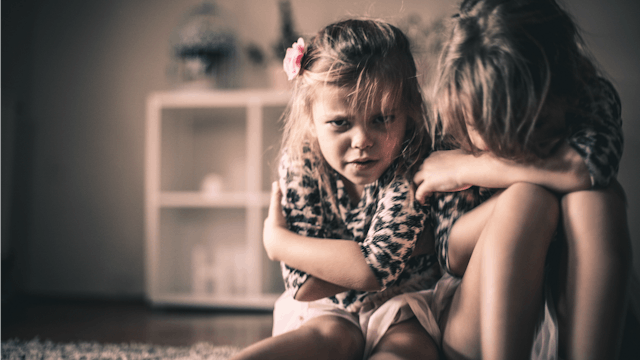I Thought It Was Just Me (It Wasn't)

A mother of a child in one of my twins’ kindergarten class asked me how my daughter is doing with school. Our daughters were sitting together, looking through a large picture book at their small table. “We’re having some transition issues,” I said, even though I don’t know her well—in fact, we’d just met in the classroom amidst the chaos of morning drop off.
“Oh,” she said a little too happily, “I thought we were the only ones.”
I shared the details of my five-year-olds’ tantrums: the crying over little issues, the defiance about all things at home; my daughter started telling other people that her teacher is mean and everyone in her class pushes her. (These things are not true; I’ve checked.)
“Everyone else tells me ‘Everything is fine,’ when I ask them how kindergarten is going. I don’t get it.”
I have been in that place—looking to share a new and wobbly experience with other mothers. It is confusing to hear everyone else is doing just fine.
When my oldest daughter was born, and I was exhausted, defeated by breastfeeding, traumatized in many ways attempting to create a new normal in which I didn’t feel overwhelmed, irritable, and terrified most of the time. When I asked other new mothers in our baby gym class, or in coffee shops how they were doing, my heart sunk when I heard a chirpy “Wonderful!”
I didn’t find my squad until I met a few other women with babies my daughter’s age who admitted to wanting to throw the baby out the window after hours of crying they couldn’t understand or stop.
No one was going to actually throw a baby anywhere; we all knew that. And we shared many triumphs of new parenthood as well as the hardships; but it was good to realize there is indeed a space in this huge maze of motherhood in which we can unload our truths.
I don’t want other people to be miserable. In fact, I want to share ideas and solutions to our common problems, as well as support. But if you can’t admit that, at least some of the time, parenting feels like punishment for sins of a past life, then we probably aren’t going to get along.
A day after my conversation in my daughter’s classroom, I ran into another mother I know from a few years ago, when our kids attended an afternoon program together. She asked, “How is everyone doing in school?”
I told her, “We’re still having some problems at home. They are great in school—but they save all their anxiety for me at home.”
She also looked relieved.
Are these mothers particularly cruel and sadistic? Did they enjoy hearing how my kids are suffering and I’m stumbling through it?
Of course not; however, either everyone else’s children are way more well adjusted than ours, or everyone else is lying. Because I’ve seen other children crying in the morning, clinging to the last minutes mom or dad is in the classroom, I am certain my children are not the only ones having trouble adjusting to a long day and having new and great expectations placed upon them.
I don’t know why we don’t tell each other the truth. I respect that other people are private and less “share-y” than I am (after all, I am a writer of details, ugly and uncomfortable; not everyone else is). But to insist even after another mom has shared her fear or frustration, that everything is “fine” in your home all the time says to me there is unnecessary pressure to keep a perfect face on.
I blame a great deal of that pressure on social media. And I am not saying that I don’t want to see everyone’s happiest moments; I share mine too. No one should feel they cannot or should not share the beautiful, ethereal, the sublime moments of parenting and in life. It inspires us, it is what we wish for each other and ourselves.
But I do believe there is an imbalance in our public portrayal of motherhood. And it’s not doing anyone any favors. The perfect mothers have unceasing pressure to remain perfect, to top themselves over and over, to keep their insecurities and royal mess ups to themselves. The rest of us realize we will never keep up. Some of us blame ourselves or our imperfect children (but mostly ourselves) for our poverty of picture-perfect heartwarming moments; we can’t seem to duplicate what we just “liked” on Facebook and Instagram.
The mothers I meet are craving connection with something and somebody to which they can relate.
I will not lie about what goes on in my home—the hysterical, absurd, embarrassing, awkward, frightening. I’ve probably made people uncomfortable, in fact, divulging some of the grittier truths of our daily lives. I get that it’s hard to properly respond to “my daughter keeps telling people I want to kill her.”
There are risks to removing the gauze from the wounds of our lives, in public, with witnesses. There are people who avoid me, I’m sure. But I’ve found connection, comfort, humor, humility as well. I’ve found the most beautiful of humanity in our shared broken places, and our ability to speak honestly of them.
This article was originally published on